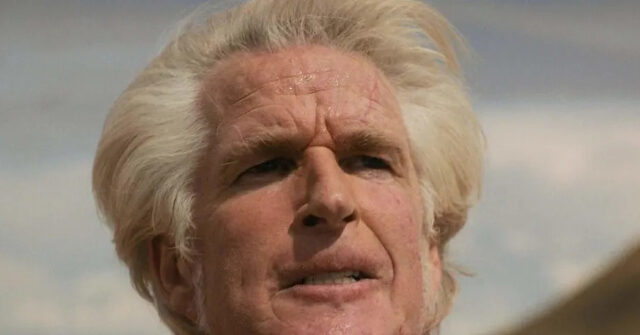Matthew Modine, best known for his role in Netflix’s “Stranger Things” and as Private Joker in “Full Metal Jacket,” publicly critiqued Donald Trump after the former president incorporated clips from the iconic anti-war film in a political advertisement targeting what he deemed “wokeness” in the U.S. military. In the ad, Trump leverages Modine’s film to juxtapose R. Lee Ermey’s intense drill sergeant role against TikTok videos featuring military personnel who identify as transgender. Trump’s declaration, “We will not have a woke military!” highlights his agenda to eliminate progressive trends from military culture, which he believes undermines traditional values.
Modine’s condemnation of Trump’s use of his film is steeped in historical comparison, drawing parallels between Trump’s rhetoric and the propaganda techniques used by Nazi Germany, particularly referencing filmmaker Leni Riefenstahl. Modine elaborated to Entertainment Weekly that Riefenstahl’s iconic propaganda works, specifically “Triumph of the Will,” were extremely influential in molding public perception during the Nazi regime. He emphasized how Trump has manipulated the themes of Stanley Kubrick’s film, intended as an anti-war statement, into a tool for divisive and often homophobic political discourse. This distortion, according to Modine, aligns Trump with the propagandistic strategies of authoritarian leaders, warning that such actions mirror historical precedents of deception and manipulation.
In continuing his reflections, Modine recalled Riefenstahl’s later life acknowledgment of her complicity with Hitler, where she expressed regret for being blinded by the allure of his promises. By invoking Riefenstahl’s cautionary words, Modine hints at the dangers of ignoring the darker implications of a populist leader’s promises. He urged the public to be vigilant regarding Trump’s actions, suggesting that he has made his intentions clear, echoing concerns from history about the rise of oppressive regimes. Modine’s statement is a call to action for audiences to question and challenge narratives that appear polished on the surface but have potentially damaging outcomes.
Adding another layer to the conversation, Vivian Kubrick, the daughter of director Stanley Kubrick, responded to the debate by stating that her father would likely have been unfazed by Trump’s appropriation of “Full Metal Jacket” footage. She expressed that Trump understands the irony behind using scenes from a film that explores the complexities of human nature amidst the chaos of war. Vivian posited that her father’s work delves into the paradoxes inherent in military life and society, suggesting that Trump’s usage aligns with a strong military’s necessity in the modern world. Her defense reflects a belief in the multifaceted interpretations of artistic works, asserting that they can serve various political ends, sometimes contrary to their original intentions.
Vivian Kubrick’s remarks included commentary on how her father appreciated Ronald Reagan’s presidency and could have supported similar uses of his films for political discourse. She implied that Kubrick would recognize the broader implications of his work being used in socio-political contexts. The juxtaposition of different perspectives further emphasizes the complexities of interpreting film as a vehicle for political messaging. This melding of cinematic legacy with contemporary issues raises questions about the ethical boundaries of artistic work in serving political agendas, illustrating the ongoing discourse in media literacy and representation.
In conclusion, the utilization of “Full Metal Jacket” clips by Trump has sparked an intense dialogue about the interplay between cinema, propaganda, and political rhetoric. While Modine decries the appropriation of the film’s anti-war message for a political agenda he sees as divisive and regressive, Vivian Kubrick presents a contrasting view that stresses the dynamic interpretation of film within the context of societal debates. This clash of interpretations highlights how art can be co-opted in ways that challenge its original message, reflecting broader societal conflicts around issues of identity, military representation, and the nature of political discourse in a rapidly changing world. As the conversation continues, it serves as a pertinent reminder of the power of imagery and narrative in shaping public perceptions and ideologies.

